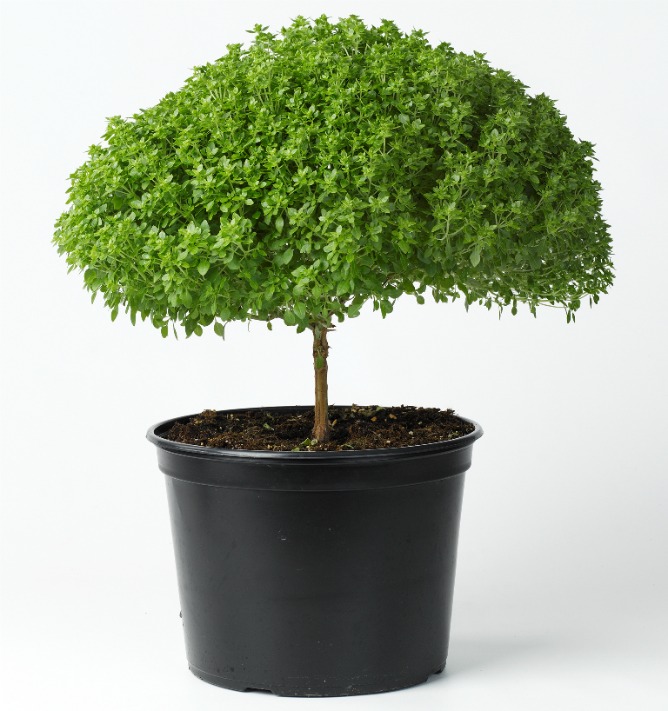Sacred to some, and with a long list of medicinal properties, basil is an herb Americans usually like tossed into spaghetti sauce or on top of pizza. Like most herbs, basil tastes best when it’s fresh.
The Israeli company Hishtil (“seedling” in Hebrew) revolutionized the market for fresh herbs and spices around the world, and now it has developed a new strain of basil for discerning taste buds. Normally basil has a short shelf life, and the plant rarely lives longer than a year.
Using patented techniques, Hishtil grafted two types of basil plants together — a hardy “secret” strain that grows a sturdy trunk, and a leafy aromatic Greek variety with tasty leaves. Together they form the world’s first basil tree. And while the tree still may be sensitive to lower temperatures come winter, bring it inside where it’s warm, says Menny Shadmi, the head of marketing for the company, and it will live a long time.
Spread the Word< br/>
• Email this article to friends or colleagues< br/>
• Share this article on Facebook or Twitter< br/>
• Write about and link to this article on your blog< br/>
• Local relevancy? Send this article to your local press< br/>
Five years and counting
One of the company’s first grafted trees is already five years old and is doing well, Shadmi adds, hoping the new basil tree will attract hobby plant growers and the nurseries that cater to them.
The new basil tree can also be grown as a bonsai — perfect for city-dwellers looking to grow their own herbs and spices, and also for suburban vegetable gardeners. It can be harvested regularly, but it must keep two-thirds of its leaves at all times to stay healthy.
“Basil is not perennial and dies when the cold period arrives,” explains Shadmi. “So we grafted two species [that] result in a plant which we call an ‘in and out.’ Take it out to the garden in summer and bring it inside in the winter. It will survive for five years.”
Developed to be pest-tolerant, the new tree is also somewhat drought-tolerant.
An industry sprouts from Israel
Founded in 1974, Hishtil was originally the local subsidiary of an American company called Seedling developed by the late George Todd. Eventually, the Israeli company became a successful enterprise in its own right, developing a proprietary system for grafting vegetables for the professional market.
One of its big customers is Ball Horticultural in Chicago. The hobby market makes up only 12-15 percent of its business, while the rest is for professional growers.
[scrollGallery id=11 useCaptions=true]
Hishtil is based on Moshav Nehalim and has 400 employees, and another 300 at worldwide locations. It has joint-venture nurseries in Turkey, Italy, South Africa, Bulgaria, France and Bosnia.
It is little known, says Shadmi, that Israeli companies like Hishtil developed the fresh-cut herb and spice market. “We call ourselves herb specialists, as we developed the first cut herbs 20 years ago in the young Israeli industry,” he says.
“I don’t know if you’ll remember this, but 25 or 30 years ago the majority of herbs we used to cook with were dried. Israel invented the idea of fresh-cut herbs – yes, the whole idea. Now it’s possible to buy from lots of sources from around the world who are growing, harvesting and providing long-shelf-life herbs and seeds for continuous growth. We at Hishtil can claim no rights for developing this idea entirely, but we were part of an industry in which we supplied raw materials for growers,” Shadmi points out.
Today, Hishtil exports a wide variety of edible plants, wildflowers and ornamentals; develops nurseries from scratch and provides training for nursery personnel on crop growth and protection.
Its Plantech training center offers a model nursery, and its EcoStarter program teaches agronomists how to use fewer chemicals. Hishtil has also developed unique products like the Tomaisin, a tomato-raisin hybrid. And now, a basil tree that keeps growing leaves long after the regular variety has turned into compost.













